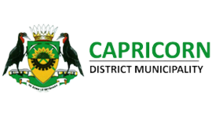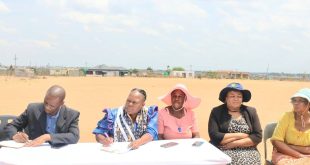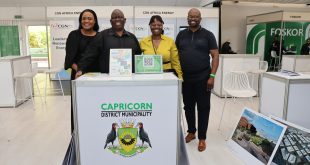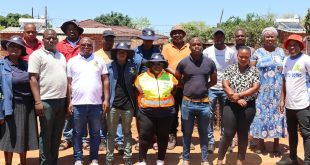 The Executive Mayor Cllr Mamedupi Teffo delivered the State of the District Address (SODA), on 27 June 2025 at Polokwane. The address was a reflection of the R1. 4 billion approved 2025/2026 IDP/Budget. Part of the SODA was an Imbizo led by the Speaker of Council Cllr Kholofelo Lehong. The SODA and Imbizo were broadcast live, simulcast on Energy fm and the following community radio stations in the district, Mohodi, Moletsi, Botlokwa, Turf, Mphahlele and Blouberg.
The Executive Mayor Cllr Mamedupi Teffo delivered the State of the District Address (SODA), on 27 June 2025 at Polokwane. The address was a reflection of the R1. 4 billion approved 2025/2026 IDP/Budget. Part of the SODA was an Imbizo led by the Speaker of Council Cllr Kholofelo Lehong. The SODA and Imbizo were broadcast live, simulcast on Energy fm and the following community radio stations in the district, Mohodi, Moletsi, Botlokwa, Turf, Mphahlele and Blouberg.
Below is the State of the District Address.
The host presenter
The Council Speaker, Cllr Kholofelo Lehong
Representatives from our municipalities who are here in the studio
Representatives from special focus groups such as disabilities, albinism, deaf, and blind SA
Ba theeletši, listening to our radio stations from Mphahlele FM, Turf FM, Energy FM, Mohodi FM, Moletjie FM, Blouberg FM, Botlokwa FM, and those who are following us on social media platforms.
Re a lotsha
It is both a privilege and a profound responsibility to address you today through this radio broadcast, as we take a moment to reflect on the journey of the 7th Administration of Local Government and prepare ourselves for the road leading up to the 2026 local government elections.
The radio address reflects on the progress and challenges of the 7th Administration of Local Government as it nears the 2026 elections. It highlights local government as the closest level to the people, where services like water, electricity, and roads are delivered and dignity is restored.
This inclusive State of the District Address is being shared across eight community radio stations, with community representatives participating directly in the studio, and listeners are encouraged to call in when lines are open. This is part of efforts to build a responsive, transparent, and accountable government.
Key achievements include improved governance, financial controls, and making IDPs actionable. Looking ahead, the focus is on handing over completed water projects, ensuring transparent community engagement, and safeguarding democracy.
Service delivery remains a challenge, with ongoing demands for basic services. The government is responding by:
- Improving the reliability and quality of services,
- Strengthening municipal skills and innovation,
- Combating corruption,
- Enhancing community engagement, and
- Working across all spheres of government to resolve systemic issues.
Listening, Acting, Delivering
The leadership of the district, including our Council Speaker, Chief Whip of Council, and oversight committees, has engaged communities across the district, hearing both their frustrations and hopes. In response, they committed to delivering real, visible change in honour of 31 years of democracy.
However, a serious challenge has emerged: self-serving criminal groups, referred to as “mafias”, are sabotaging key infrastructure projects like water, electricity, and road development for personal gain. These acts of vandalism and intimidation are not just crimes but direct attacks on service delivery.
The government is working with law enforcement to protect projects and hold perpetrators accountable, but community support is essential, and you are the first ones to know all these perpetrators. Please report them. Residents, traditional leaders, ward committees, and civil society are urged to actively defend these initiatives by speaking out and reporting criminal behavior. The message is clear: silence enables sabotage, and protecting development is a collective responsibility.
Madam Speaker, le ba theeletši , the work continues. Let us walk forward together, not as government and people, but as partners, determined to build a Capricorn District that thrives for all who live in it.
SPATIAL PLANNING AND DEVELOPMENT
Madam Speaker and our guests in the studio, the transformation of the spatial character of our district is a cornerstone in building an integrated, sustainable, and liveable region, one where all citizens enjoy improved access and connectivity to essential socio-economic services.
To accommodate the district’s growing population, stronger collaboration with traditional authorities on land use is essential for aligning new settlements with broader development plans, including schools, clinics, parks, and economic hubs.
Through cooperative governance, public participation, and an updated spatial development framework (SDF), the district aims to achieve inclusive and sustainable growth.
The District Development Model (DDM) is progressing well, with active support from key champions, including MEC Kgabo Mahoai and MEC Basikopo Makamu, and Deputy Minister of Cogta Dr. Namane Masemola. The establishment of a district war room is a major step in addressing service delivery challenges.
For 2025/26, R522,000 has been allocated to review and strengthen the SDF and to host spatial planning awareness sessions across the district.
Economic Transformation
Hosting presenter, creating a conducive environment for investment is essential to driving economic growth and social development in our District. In recognition of this, we have implemented a range of initiatives aimed at fostering a thriving local economy across key sectors such as agriculture, manufacturing, tourism, and mining.
The district remains seriously concerned about the high unemployment rate of 37%, particularly affecting youth and women. In response, initiatives like the Expanded Public Works Programme (EPWP) play a key role in creating jobs and delivering infrastructure.
Key achievements this year include:
- Creating 2,622 work opportunities, exceeding the target of 1,959.
- Supporting 20 farmers with market access and information, with plans to assist 20 more.
- Assisting 15 small enterprises through business incubation, bringing the five-year total to 120 SMMEs supported.
The district is committed to inclusive development by fostering entrepreneurship, especially women-owned cooperatives and SMMEs.
To strengthen this, R1.2 million has been allocated for the 2025/26 financial year to review the Local Economic Development (LED) Strategy, focusing on enterprise incubation, skills development, market access, and broader business support.
Environmental Management
Setšhaba sa Hesu, a clean, safe, and healthy environment, is inseparable from the well-being of our communities. Capricorn District is driving impactful environmental initiatives to create a greener, cleaner, and more self-sustaining future. Key interventions include:
- Air Quality Monitoring: Advanced instruments are in use to ensure clean air for residents.
- Biodigester Project: A biodigester in Marobyane village, Blouberg, converts cow dung into clean biogas and produces bio-slurry for organic farming.
- Environmental Management Plans: All local municipalities now operate with formal plans guiding sustainable development.
- Compliance Monitoring: 50 environmental inspections have been conducted this year, with a goal of 60 in the next.
- Environmental Education: A partnership with WESSA brings eco-awareness into schools, with recognition for learners showing leadership.
- Tree Planting Campaign: A new “One Person, One Tree” initiative will see 600 indigenous trees planted in 2025/26.
- Recycling Promotion: In partnership with Much Asphalt, recycling bins have been distributed to 11 schools to instill waste separation and environmental responsibility.
The district remains dedicated to environmental education as a catalyst for long-term behavioral change and the cultivation of environmentally responsible citizens.
Disaster and Emergency Services
Madam Speaker, Disaster risk awareness remains a top priority on our developmental agenda. Between October 2024 and January 2025, we were faced with severe weather marked by heavy rains and strong winds, causing widespread damage to infrastructure, homes, schools, and utilities. The district extends heartfelt appreciation to all stakeholders and communities who supported relief efforts.
Key interventions include:
- Disaster Awareness Campaigns: Ongoing community outreach to educate residents on hazard preparedness and response.
- Global Observances: The district commemorates the International Day for Disaster Risk Reduction (IDDR) to share progress and strengthen partnerships.
- Volunteer Recruitment: Disaster volunteers have been recruited across local municipalities to assist as community-based first responders during emergencies.
- Fire Safety Education: Through initiatives like International Firefighters’ Day (IFFD), the district promotes fire safety and honors the critical role of firefighters.
- Fire Station Infrastructure: The district operates several well-equipped fire stations:
- Sefako Makgatho (Lepelle-Nkumpi)
- Blouberg (Senwabarwana)
- Molemole (Botlokwa)
- Polokwane Central
- TT Cholo Fire Station (Ga-Rampuru) – nearing completion to serve the Aganang Cluster
For the 2025/2026 financial year, we have allocated R1.2 million for disaster management and R670,000 for fire and emergency services to bolster our preparedness and response capabilities. Furthermore, we are working in partnership with institutions such as the Red Cross, COGHSTA, Santam and other partners, who are co-funding various disaster-related interventions to strengthen our collective impact in times of crisis.
Emergency Contact Number: Residents are urged to remember and use the disaster/emergency number 0800 666 777 responsibly. Timely reporting can save lives and property. Capricorn District remains committed to enhancing community resilience, improving emergency response, and protecting lives through proactive disaster management.
Municipal Health Services
Capricorn District Municipality is strengthening disaster preparedness and public health through enhanced collaboration with stakeholders and the Municipal Health unit. Efforts include public health education, environmental cleanliness campaigns, and regular health inspections, such as unannounced visits to mortuaries, spaza shops, and high-risk facilities, to ensure hygiene compliance and prevent disease outbreaks.
Additionally, Council has approved a draft Standard Bylaw for Township Economies, aimed at fostering inclusive economic development by guiding municipalities in promoting commercial activity and designating business zones in townships. Through these initiatives, the district is working toward becoming more proactive, responsive, and resilient, with a strong emphasis on health, safety, and sustainable development.
We have put aside a R350,000 budget for the following year.
Municipal Community Sports, Arts, and Culture
Despite limited funding, we remain committed to fostering community well-being by supporting sports, arts, and cultural activities. The municipality actively promotes youth participation and healthy living through various local initiatives.
Key highlights include:
- The Annual Four-in-One Marathon: A flagship event attracting over 2,500 athletes from across the country, showcasing the district’s unity and community spirit.
· Celebrating Local Talent: Honoring inspirational figures who hails fro the district. To mention but a few – a Grand Slam wheelchair tennis champion, Kgothatso Montjane from Seshego, and Pearl Mathebula, the 2025 Miss Teen International winner from Makotopong and many others.
As Heritage Month nears in September, the district calls on residents to celebrate their cultural diversity and shared identity, reinforcing the belief that a healthy, united community is a thriving one.
Social Development
Setšhaba sa Hesu, we remain deeply committed to the inclusion, protection, and empowerment of vulnerable groups and youth. Key priorities include:
- HIV/AIDS Response: The District AIDS Council, in coordination with Local AIDS Councils, continues to lead efforts in addressing the HIV/AIDS epidemic, with a focus on young adults and women affected by socio-economic vulnerabilities and risky behaviours.
- Youth Development Initiatives:
- Build-Better-Boys Camp we support teenage boys in positive personal development each year.
- Matric Enrichment Camp provides academic support to Grade 12 learners ahead of exams, and some learners will start going to this camp from Sunday.
- Youth Empowerment Through Digital Skills, a partnership with Limpopo Connexion, is offering a free online AI training programme targeting 5,000 youth aged 18–35 to prepare them for the digital economy. Applications are closing on the 30th June 2025.
- Inclusion of Vulnerable Groups: The district ensures that persons with disabilities, including the deaf, blind, and individuals with albinism, are actively supported and integrated into development programmes.
- Substance Abuse Prevention: The district views drug and alcohol abuse among youth as a growing social crisis and is intensifying coordinated, multi-sectoral efforts to combat it.
- Gender-Based Violence (GBV) Response: The District GBVF Rapid Response Team will be launched to provide swift, multi-sectoral action in cases of GBV. This initiative will prioritize survivor support, prevention, and accountability, calling for collaboration across government, civil society, and communities.
These efforts reflect our dedication to creating an inclusive, safe, and empowered society where every individual, especially the most vulnerable, has the opportunity to thrive.
For the next financial year, we are putting aside R697,000 for special focus programmes, HIV/Aids prevention and care, and educational support to matrics.
MUNICIPAL TRANSFORMATION AND ORGANISATIONAL DEVELOPMENT
Hosting Presenter, our Integrated Development Plan (IDP) and budget was formally adopted on 23 May 2025, outlining key development priorities and the need for institutional reform to better meet community needs. As the new financial year begins in July, the focus will be on strengthening administrative efficiency and ensuring responsive service delivery.
The municipality has welcomed 76 new employees across local municipalities to support infrastructure operations and maintenance, along with 54 interns from an environmental management program. While gender representation in management is balanced, more effort is needed to ensure the administration reflects the district’s demographic profile. Recruitment processes are ongoing, with shortlisting underway and interviews planned for the new financial year.
PROMOTING GOOD GOVERNANCE
Ba theeletši, we continue to strengthen democratic governance by promoting active public participation across all 113 wards and supporting key oversight structures like MPAC, the Audit Committee, and the Risk Management Committee. Robust internal controls and anti-fraud systems are in place to uphold ethical governance, with calls for the public to report any suspected fraud.
Significant progress has also been made in ICT, with 28 community wi-fi sites now equipped with Community Shared Networks and five more planned in the upcoming financial year. To improve service delivery, especially in water and fire services, the municipality has invested in operational vehicles and urges that they be used responsibly.
Additionally, four mobile offices have been procured to enhance support for staff at the Blouberg satellite office. The municipality remains committed to improving service delivery, recruiting skilled personnel, and investing in resources that elevate the quality of life for all residents.
BASIC SERVICE DELIVERY INFRASTRUCTURE DEVELOPMENT
We continue to make meaningful progress in implementing service delivery and water infrastructure projects, despite facing significant challenges such as budget constraints, sabotage, and logistical difficulties.
Key highlights include:
- Commitment to Service Delivery: The district remains focused on delivering high-impact projects that directly address community needs and improve quality of life.
- Infrastructure Development: Emphasis is placed on the development and renewal of both social and technical infrastructure, which is essential for meeting growing population demands, attracting investment, and promoting local economic growth.
- Strategic Focus: The municipality prioritizes visible, results-driven interventions that support the district’s long-term social and economic development goals.
This progress reflects the district’s resilience and unwavering dedication to building a better future for all its residents.
Water supply
According to Census 2022, CDM’s access to piped water is 87,3%, which then puts the backlog at 12.7%. Ensuring access to piped water remains our top priority, as water is essential for both economic growth and the well-being of our communities. A lack of a reliable water supply not only deepens poverty but also hinders socio-economic progress.
In Blouberg, we are implementing –
- Water projects (MIG) to benefit Grootpan, Sias, Longden, Ramaswikana. The Phase 1 is at 99%; however, it is not yet operational. Phase 2 is currently in the tender process and is scheduled to commence in July 2025, with an anticipated completion date of June 2026
- In Kroemhoek, Makgato, Devrede, Taaibosch, the project is at 70%. The primary challenge facing the project is the water source, specifically the boreholes. A new borehole has been drilled, and we are currently awaiting yield and water quality test results.
- For the new stands in Kroemhoek, Makgato, Devrede, and Taaibosch under Project B, implementation has reached 100% However, the boreholes are currently producing low yields. An investigation is in progress to identify the root cause, and system automation is planned to prevent over-pumping and promote sustainable water usage
- The Milbank water project is at 96%,the boreholes have been equipped and tested. Due to the high cost of electrification, the project is scheduled to be energised in the new financial year. In the interim, water will be pumped using mobile generators
- The Inveraan Water Supply Project A has reached 100%completion, while Project B is currently at 85%. Delays in Project B were attributed to a poorly performing contractor. A final warning was issued, and the contractor was required to implement cessation agreements for the tank and package plant to facilitate continued progress.
- The current progress of key water and sanitation infrastructure projects funded through the Water and Sanitation Infrastructure Grant (WSIG). These projects are critical to improving access to a reliable water supply and sanitation services within the municipality.
- The construction of both the Matshoana and Madoana Water Supply projects has been successfully completed, with progress reaching 100%. These projects, funded through the Water Services Infrastructure Grant (WSIG), will be officially handed over to the communities soon.
For Blouberg, the implementation of all the above-mentioned water projects, with a remaining allocation of R41, 1 million, is scheduled for the 2025/2026 financial year.
In Lepelle-Nkumpi, we are implementing the –
- The Mphahlele Water Scheme, a multi-year project which is currently at 98% completion, is poised to significantly enhance water access for several communities, including Bolatjane, Mogodi, Lenting, Tjiane, Tooseng, Thamagane, Malekapane, Hwelesaneng, Mamaolo, Makurung, Dithabaneng, and Phalakwane. The project is anticipated to reach full completion within the current year. Eskom has commenced the design work for the electrification of the water treatment package plant and associated pump stations, a critical step toward operational readiness.
- The Groothoek (Lebowakgomo Zone B) Water Supply B is at 90% construction; however, progress has been impacted by poor performance from the appointed contractor. In response, the municipality has issued a final warning letter to the contractor to address and rectify the delays with immediate effect.
- The Stocks Regional Water Supply Project – Phase 1 is underway, implemented through multiple construction contracts progressing at different stages. The project will benefit a total of 13,083 households across affected areas.
- Contract A: 45% complete – Borehole source development at Motantanyane (Ward 14)
- Contract B: 56% complete – Reticulation works in Mmakotse (Ward 13)
- Contract C: 25% complete – Construction of a pump station in Ga Ledwaba (Ward 13)
- Contract D: 45% complete – Reticulation along the main pipeline in Ga Ledwaba (Ward 13)
- Contract E: 20% complete – Construction of a 5ML reservoir in Ga Ledwaba (Ward 13)
- All five contracts are progressing well, and no significant challenges have been reported to date. The project remains on track in terms of implementation, with regular monitoring and coordination ensuring smooth execution across all sites.
For Lepelle-Nkumpi, the implementation of all the above-mentioned water projects, with a remaining allocation of R84 million, is scheduled for the 2025/2026 financial year.
In Molemole,
The construction progress of various regional and Water and Sanitation Infrastructure Grant (WSIG) funded water supply projects is currently being implemented across several villages in Molemole. These projects are aimed at improving water accessibility and service delivery in underserved areas.
- The Sefene, Eisleben, Matseke & Ramatshowe Regional Water Scheme – Phase 1 (Contract A), the construction progress is currently at 45%. The project is proceeding steadily, and efforts are ongoing to ensure timely completion within the project timeline.
- The Ga-Phasha Water Supply – Contract A, this project is also at 45% Work is progressing in line with the schedule, and monitoring continues to ensure adherence to quality standards and timelines.
- When it comes to WSIG-Funded Projects, Eisleben / Ga-Masekela Water Supply construction is currently at 70% Dikgolaneng Water Supply, the project has reached 95% construction, nearing finalisation. Matseke Water Supply, progress stands at 65% construction. Ga-Maribana Water Supply, the project is currently at 70% construction. The Ga-Phaudi Water Supply construction progress has reached 75%.
- The Ratsaka Water Supply Project has reached 100% completion and will soon be handed over to the community. The project was funded through the Municipal Infrastructure Grant (MIG).
For Molemole Municipality, the implementation of all the above-mentioned water projects, with a remaining allocation of R79, 4 million, is scheduled for the 2025/2026 financial year.
LEBOWAKGOMO WASTEWATER TREATMENT WORKS (WWTW) UPGRADE
The municipality has submitted an application for the upgrade of the Lebowakgomo Wastewater Treatment Works through the Regional Bulk Infrastructure Grant (RBIG), due to the plant currently operating at 5.87 ML/day, significantly exceeding its design capacity of 3 ML/day.
Key developments include:
- An Environmental Impact Assessment (EIA) is underway as a requirement for funding approval by the Department of Water and Sanitation (DWS).
- The proposed upgrade will increase plant capacity to 15 ML/day.
- A draft Memorandum of Understanding (MoU) is being prepared for discussion with the Mphahlele Tribal Authority to secure servitude alignment, while the Ledwaba Tribal Authority has already granted Permission to Occupy (PTO).
- The municipality’s application to serve as the Implementing Agent for the project has been approved by DWS.
- DWS has also allocated R20 million for planning and design in the current financial year, and the planning phase is already in progress.
This upgrade is critical to meeting future demand, improving service delivery, and ensuring compliance with environmental standards.
New Water Supply Projects Funded Through WSIG
We are proud to announce a major new water infrastructure initiative funded through the Water and Sanitation Infrastructure Grant (WSIG), with a total investment of R130,190,773.99. This initiative will significantly improve water access across several villages, benefiting thousands of residents.
Beneficiary Communities:
- Makweng Village (Groothoek RWS – 2 sub-projects)
- Avon Village (Taaiboschgroet GWS – 2 sub-projects)
- Milbank Village (Milbank Water Supply)
- Ga-Kgatla Village (Taaiboschgroet GWS)
- Maokeng, Mashalane, and Dilaeneng (3 sub-projects)
- Ditatsu Village (Ditatsu Water Supply)
- Driekoppies and Silvermyn Villages
Some of the projects are divided into multiple phases and will be implemented over multiple years to ensure long-term sustainability and quality service delivery. This initiative represents a significant step forward in advancing water security, dignity, and quality of life for communities across the district.
Management of Conditional Grants
An extra R20 million was received, increasing the total MIG allocation to R283,563,000. This improved funding position enhances the municipality’s ability to deliver critical infrastructure and accelerate service delivery across the district.
Operations and Maintenance
Ba theeletši, the challenges and progress related to the repairs and maintenance of water and sanitation infrastructure within the municipality during the current financial year and provides an outlook for the 2025/2026 budget allocation.
We continue to make progress in the operation and maintenance of water and sanitation infrastructure, despite ongoing challenges and budgetary constraints.
Wastewater Treatment Operations
- Currently operating at 80% functionality across the district.
- While progress is evident, some facilities still require additional support to reach full capacity.
Water Treatment Operations
- Functionality stands at 70%, with ongoing improvements aimed at enhancing water purification and distribution efficiency.
Water Delivery via Tanker Trucks
- 29 water tankers are deployed rotationally to areas facing shortages.
- This is a temporary measure, and the municipality’s long-term goal is to ensure 24/7 water access through fully operational infrastructure.
Key Challenges
- Ageing infrastructure is causing frequent breakdowns.
- Theft and vandalism are increasing operational costs and service disruptions.
- Unplanned village expansions are straining existing systems and complicating delivery.
Response and Maintenance Efforts
- Over 2,300 water and sanitation breakdowns have been attended to in the 2024/2025 financial year.
- R80 million was allocated for repairs and maintenance in 2024/2025 (post mid-year adjustment).
- R28 million has been budgeted for the 2025/2026 financial year to continue these efforts.
Budgetary Constraints
- Current funding for wastewater operations remains insufficient, impacting the ability to meet environmental compliance and maintain full functionality.
- Additional investment is needed to address system inefficiencies and improve service reliability.
Despite these constraints, the municipality remains committed to minimizing service disruptions, responding efficiently to breakdowns, and working toward sustainable and reliable water and sanitation services for all communities.
For the next financial year, we will spend R28m on operations and maintenance.
Water Quality
The municipality’s partnership with the University of Limpopo’s Water Testing Laboratory strengthens the management of drinking water quality by identifying risks and implementing corrective actions. This collaboration supports efforts to improve the district’s Blue Drop status for safe drinking water and ensures wastewater effluent meets discharge license standards, contributing to improved Green Drop status.
Water Quality Accreditation
- The municipal Water Quality Laboratory maintains 100% participation in national accreditation programs, including:
- South African National Accreditation System (SANAS)
- National Laboratory Association (NLA)
- South African Bureau of Standards (SABS)
- These accreditations guarantee that water testing and quality control meet national standards, ensuring safe and compliant water services.
Wastewater Risk Abatement and Green Drop Compliance
- The municipality has completed 32 interventions addressing recommendations from the Green Drop audit, enhancing wastewater system performance and reducing health and environmental risks.
- The goal is full compliance with Green Drop certification across all wastewater facilities.
Water Safety and Monitoring
- Comprehensive Water Safety and Security Plans are in place to identify and mitigate risks, ensuring water quality meets national and international standards.
- Regular water quality monitoring and sampling facilitate early detection of contamination risks and enable prompt corrective measures.
- Online chemical dosing systems optimize disinfection processes for consistent delivery of safe drinking water.
- The municipality prioritizes securing essential treatment consumables to maintain operational stability and sustainable water and wastewater treatment.
Through these strategic initiatives, Capricorn District demonstrates strong commitment to regulatory compliance, environmental stewardship, and the provision of safe, reliable water and sanitation services to its communities.
For the next financial year, we are setting aside a budget of R12.7 million to collect 1900 samples for testing.
Sanitation
Ba theeletši, without access to adequate and dignified sanitation facilities, our vision of restoring the dignity of our people will remain out of reach. Currently, 41.9% of households in the district have access to flush toilets, leaving a sanitation backlog of 58.1% without such access.
The district has developed and secured Department of Water and Sanitation (DWS) approval for technical reports to construct Ventilated Improved Pit (VIP) toilets across three local municipalities. These are now under review by COGHSTA to obtain Municipal Infrastructure Grant (MIG) funding.
While funding approval is pending, immediate interventions are underway, with:
-
- R10 million allocated from the Water Services Infrastructure Grant (WSIG)
- R20 million from MIG
These funds will support the construction of VIP toilets in the upcoming financial year, marking a vital step in reducing the sanitation backlog and improving safe, dignified sanitation access.
Project Progress Highlights
- Blouberg: The Alldays Sewer Project, bordering Vhembe District, is 70% complete, with progress closely monitored to ensure quality and timely delivery.
- WSIG Projects: Matshoana, Madoana, and Alldays projects have all surpassed the 70% construction milestone, showing satisfactory advancement.
- Lepelle Nkumpi: The WSIG-funded sanitation project at 75% completion targets communities including Mphaaneng, Success, Madiba Park, and Mafefe, promising improved hygiene and public health.
- Molemole: WSIG sanitation projects are progressing smoothly with active contractor engagement and ongoing quality monitoring.
These efforts collectively demonstrate our commitment to addressing sanitation challenges and enhancing public health through improved infrastructure delivery.
MUNICIPAL FINANCE MANAGEMENT AND VIABILITY
Celebrating Audit Excellence and Advancing Good Governance
Ba theeletši, every public institution aspires to achieve good audit performance, not just as a mark of compliance, but as a true reflection of ethical leadership, sound governance, and unwavering accountability. Achieving this milestone is no easy task; it demands hard work, technical expertise, discipline, and, above all, a deep institutional commitment to doing things right.
We have proudly achieved a clean audit outcome for the 2023/2024 financial year, showcasing strong ethical leadership, effective governance, and accountability. This achievement was formally recognized at the SALGA Municipal Audit Awards.
I also extend my congratulations to our sister municipalities, Blouberg, Molemole, Polokwane, and Lepelle-Nkumpi, for upholding high audit standards. These collective successes reinforce the district’s commitment to the Roadmap to Clean Audit by 2025/2026. The municipality remains dedicated to strengthening internal controls, enhancing oversight, and institutionalizing transparency to ensure responsible management of public resources and to restore public trust.
Financial viability
Madam Chair, le Ba theeletši, the financial viability and long-term functionality of any public institution rely heavily on effective resource management. We remain committed to strengthening financial management capacity to maintain fiscal discipline, retain our Grade 5 grading, implement a credible billing system, grow our budget base, and reduce reliance on grants.
Key Initiatives and Progress:
- A major focus has been the rollout of smart and prepaid water metering systems across the district’s six towns, aimed at improving revenue collection and addressing rising consumer debt, which now exceeds R700 million.
- This smart metering initiative aligns with the district’s broader goal of promoting responsible water usage and enhancing service delivery.
Meter Installation Achievements:
- Total of 11,774 prepaid meters installed across all six towns.
- Blouberg: 2,582 smart meters installed in areas such as Alldays, Senwabarwana, and Desmond Park.
- Molemole: 1,027 prepaid meters installed in Mogwadi and Morebeng.
- Lebowakgomo: 8,165 prepaid meters installed, enabling more efficient monitoring of water consumption and reduction of water losses.
These efforts are a decisive step toward ensuring financial sustainability, improving service efficiency, and building a more resilient and accountable municipality.
The municipality has made significant strides in billing and revenue management. Outstanding debt owed to Capricorn District Municipality (CDM) decreased from over R34 million to R26 million within a three-month comparison period, largely due to improved revenue collection through water smart meters, as well as efforts to address leakages, and excessive usage under the previous system. The payment rate increased substantially, rising from 11% in 2023/2024 to 45% in 2024/2025. Under the new smart meter system, the municipality now receives approximately R2 million in advance payments before service consumption, compared to the conventional model where payments were made two months after usage. Furthermore, distribution losses have been reduced from 38.3% in 2022/2023 to 29.7% in 2023/2024.
Additional smart meters will be installed in the new financial year, extending the benefits of accurate consumption monitoring, fair billing, and improved infrastructure maintenance to even more residents. Let us continue on this journey of transformation and financial resilience, because a financially sound municipality is a capable municipality. Let us pay for our services.
2025/26 Budget Speech
Madam Speaker, Ladies and Gentlemen, to bring all these plans to life and respond to the pressing needs of our communities, the Council has, in accordance with the Municipal Finance Management Act and relevant Treasury regulations, approved a total budget of R1.42 billion for the 2025/2026 financial year.
For the 2025/2026 financial year, the Capital Budget stands at R387.6 million, funded through a mix of internally generated funds, the Municipal Infrastructure Grant (MIG), and the Water Services Infrastructure Grant (WSIG).
This budget enables us to invest in critical infrastructure that supports long-term service delivery. Key allocations include R28 million for Water Operations and Maintenance, and R12.65 million under Corporate Services to strengthen our internal systems and support functions.
The total revenue budget for the coming year is R1.42 billion, with R1.04 billion allocated to the Operating Budget, ensuring the municipality continues to meet its day-to-day service delivery responsibilities, and R387.6 million reserved for capital development and infrastructure investment. This balanced approach ensures we sustain essential operations while building for the future.
We are committed to lasting solutions, and we know that these will not be achieved by government alone. They require collaboration, community ownership, and active citizenship. Through our individual and collective efforts, we will build a Home of Excellence and Opportunities, a district where no one is left behind.
As we work together to build a responsive and inclusive Capricorn District, we encourage you to become active partners in this journey. Your voice matters, and there are several ways you can reach us and make a meaningful impact:
- Share with us the challenges that hinder your progress.
We have launched a user-friendly mobile application called CDM Talk, which you can download on your App Store, install, confirm your OTP, and start engaging directly with us from your phone. - Give us your inputs that can shape projects into people-driven initiatives.
You can now send your suggestions and feedback via the studio WhatsApp number - Bring forward your ideas so that we may flourish together.
Participate in our public participation programmes and community meetings held across all wards. These platforms are designed to empower residents and make local governance truly inclusive.
Together, let us shape the future of the Capricorn District, a future defined by accountability, progress, and shared success.
Pula!!!!!
Thank you.
Top of Form
Bottom of Form
 CDM Municipality
CDM Municipality




